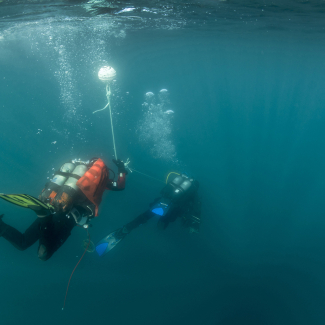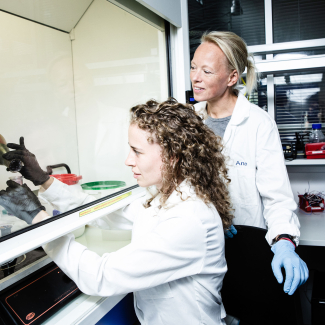
Joint creation
The CNRS's innovation policy is founded on the goal of creating the right conditions for strong and long-lasting partnerships with industry. To achieve this, the CNRS offers customised support solutions and a range of collaboration tools.
Every year, thousands of collaborative research contracts are signed with different companies. These contracts lead to joint delivery of scientific projects that produce concrete results.
An original model for co-constructing value with industry
The 'Club CNRS Enterprise'
Launched in 2022, the 'Club CNRS Enterprise' (in French) offers access to a community specifically focused on partnership between academia and stakeholders from society and the business world. It hosts visits and meetings to study scientific challenges.
The Europe Club
Launched in 2021, the 'Club Europe' (in French) brings together the CNRS's partner companies to promote meetings, sharing best practices and joint initiatives as well as identifying and setting up collaborative projects on the European stage (Horizon Europe, for example).
A sector-based approach
The CNRS has chosen a set of strategic sectors with a view to developing partnerships between the CNRS and companies. Through this focus, the CNRS invites companies to co-construct road maps for innovative and disruptive technologies where the skills and knowledge of the laboratories that it supervises intersect with the challenges faced in the different sectors.
- Aerospace
- Automotive
- Material Chemistry
- Cybersecurity
- Water
- Electronics
- Energy
- Perfumery and Cosmetics
- Health
- Photonics
A range of collaboration tools
Specific services, research projects, associated laboratories, framework agreements and multifaceted training are some examples of the collaboration assistance offered by the CNRS to bring it closer to the world of companies and the industrial community.
Portfolio access
Every year, CNRS and partner laboratories produce remarkable breakthroughs. The CNRS ensures that the intellectual property of these inventions is protected and encourages the transfer of technology and knowledge to the business world.
Learn more about the protection of research results at the CNRS
Specific services
This is the primary form of collaboration with companies and gives them access to high level scientific equipment in CNRS-supervised laboratories to carry out tests, trials and measurements of all types. Companies work independently or supported by CNRS experts.
Joint research projects
A thousand research projects are started every year with companies of all sizes. These contracts lead to scientific projects being carried out jointly, resulting in concrete deliverables. Depending on their goals, these research projects qualify for public funding, as is the case with the CIFRE – Industrial Agreements for Training through Research.
Associated laboratories
Associated research laboratories are the most developed form of cooperation for most public and private research partnerships. Contracts with companies of all sizes (large corporations, SMEs, MSBs and start-ups) are signed for 5 years in all areas of research, and are based on a shared scientific topic, joint governance and sharing of human and material resources.
Joint Laboratories: Success Stories that Inspire
- Since 2016, the CNRS, the University of Rouen Normandy, INSA Rouen, Normandie Université and the company Manoir Industries have been developing, studying and perfecting new generation steels at their IPERS (Innovation and Performance of Refractory Steels) associated research laboratory.
- Since 2012 the CNRS has been working with the Poujoulat group, the European leader in stainless steel chimney flues and stacks, to develop one of the insulating systems devised by the company. Subsequently, the two partners continued their collaboration, structuring it by creating an associated laboratory focusing on the research topic of fire safety.
- EDF and the Laboratory of Engineering Sciences for the Environment (LaSIE), under the supervision of the CNRS and La Rochelle Université, founded the associated laboratory 4evLab to study air quality.
- The SME Learn&Go and the Research Institute of Computer Science and Random Systems (IRISA), under the supervision of the CNRS, the University of Rennes 1, ENS Rennes, INSA Rennes, Université de Bretagne-Sud, the INRIA and IMT-Atlantique, founded Script&Labs: an associated laboratory that has supported academic research resulting in the release of software to help with learning to write, to be used with a stylus and a tablet.
- To understand the source of the beneficial properties of Avène spring water, the Pierre Fabre group partnered with the Laboratory of Microbial Biodiversity and Biotechnology (LBBM), under the supervision of the CNRS and Sorbonne University, to set up a joint research team.
- Michelin and the Institute of Chemistry of Clermont-Ferrand (ICCF), under the supervision of the CNRS and the University of Clermont Auvergne, combined their knowledge in the associated laboratory SimatLab to develop new techniques for modelling polymers.
- Born out of the collaboration between the Heudiasyc laboratory, under supervision from the CNRS and the University of Technology of Compiègne, and the Renault group, SIVALab is a research institution that studies and develops navigation software for driverless vehicles.
Find out all the latest news from our associated laboratories in the CNRS Innovation Newsletter (in French)
Framework Agreements
If the CNRS already has strong, consistent and long-standing links with a company, the organisation can sign a framework agreement to accelerate the smooth set-up of joint research projects. This framework agreement is the basis for developing contractual collaborations between CNRS laboratories and business, over a five-year period. These are agreements that define the scientific scope of the collaboration, the working methods, the rules of the research partnership or service provision, how the collaboration will be monitored (steering committee, governing board, technology transfer committee), how intellectual property will be shared out, and the rules concerning the use, publication and confidentiality of the results of these collaborations.
There are currently 22 active framework agreements with companies such as TotalEnergies, Safran, Solvay, EDF, Essilor, Thales and Stellantis, which is proof of the business world’s interest in this approach.
Training
'CNRS Formation Enterprises is the organisation's continuous company training department. Since it was created in 1984, it has been resolutely committed to the CNRS objective of spreading knowledge and promoting the scientific approach across society and industry, focusing on professional development.
The catalogue is frequently updated with new courses in various fields, particularly artificial intelligence, physics, instrumentation and imaging. This range of subjects demonstrates the continued commitment of the CNRS to remaining at the cutting edge of science and technology while working for the benefit of the science and business communities.
For more information, visit CNRS Formation Enterprises website (in French) or discover the 2024 training catalogue (in French).
Photo Credit: © Jean-Claude MOSCHETTI / Elast-D3 / CNRS Images

